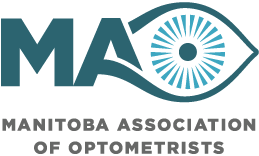As we age, our eyes change, and our risk of some eye conditions increases. The Canadian Association of Optometrists recommends comprehensive eye examinations for seniors annually. You may visit your optometrist more often if you have a specific condition requiring monitoring. Coverage by your insurer or Manitoba Health may differ from these recommendations.
Presbyopia: Age-related Farsightedness
As our eyes age, the lenses in our eyes lose flexibility and begin to lose their ability to focus on near objects. This is usually first noticed in the early to mid 40's when reading fine print becomes challenging and reading glasses, bifocals, or progressive lenses are needed. Presbyopia is a normal part of aging and happens to everyone. It causes difficulty focusing on near objects, difficulty seeing in low light, eyestrain, and temporarily blurred vision when switching viewing distances.
Common Eye Conditions in Seniors include:
Retinal Disorders are more common in mature eyes. Some common retinal conditions include:
- Diabetic Retinopathy
- Macular Degeneration (AMD)
- Retinal Detachment
Here are a few tips to keep your eyes healthy and optimize your home and work environments:
- Increase lighting levels, especially for close tasks.
- Wear sunglasses that provide 100% UVA and UVB protection. UV exposure can contribute to the development of age-related eye diseases.
- Be aware of changes or limitations in your peripheral vision while walking outside or driving.
- Get regular eye exams. During a standard eye exam your optometrist will check for changes to your visual acuity and visual field, and for signs of eye disease. Other general health concerns, such as diabetes or tumors, can often be detected during an eye exam. While some eye diseases cannot be reversed, early detection is always important for the best treatment options to slow or limit progression of a disease.
- Wear the eyewear that is prescribed for you. You may need to use reading glasses, progressives, or bifocals to compensate for presbyopia. Multifocal contact lenses are also available. Some treatments for eye disease can impact your prescription; for example, if you have had cataract surgery it is important to have your vision checked after the recommended stabilization period to ensure that you have the correct prescription for your best vision. It's not always possible to correct vision to 20/20, but your optometrist can recommend the best correction possible.
